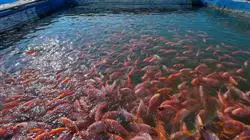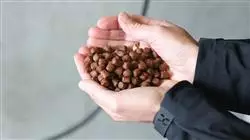University certificate
The world's largest faculty of veterinary medicine”
Introduction to the Program
Proper nutrition is essential to increase fish yields in aquaculture"

Global population growth requires new advances in breeding and farming systems to ensure an adequate food supply"
Aquaculture is an activity of great relevance, since it has become one of the most economically important activities in the field of food production and for the breeding of live organisms for repopulation and for the cultivation of species for ornamental use, among others.
The management and knowledge of nutrition in different aquatic species can be one of the fundamental factors that determine the good yield of a culture, while a poor management of this aspect can be reflected in low aquaculture production.
In the current circumstances, where the use of chemicals and antibiotics is increasingly limited, it becomes more necessary to master the application of nutrients and additives in the manufacture of feed used in the aquaculture industry.
The study of the intestinal microbiota of fish, for example, is also an important development in Aquaculture Nutrition. Currently, there is a lot of information about their composition, abundance, diversity and activity and how to make use of this knowledge to improve culture yields, since these microbes have important implications on the health of the host, its development, well-being and, above all, on its nutrition.
In addition, it must be taken into account that each type of culture has different characteristics, and therefore each species has a specific set of requirements in terms of nutrition.
This Postgraduate diploma provides students with specialized tools and skills to successfully develop their professional activity in the wide aquaculture environment, works on key competencies such as knowledge of the reality and daily practice of the professional, and it further promotes responsibility in the monitoring and supervision of their work, as well as communication skills through essential teamwork. In addition, as it is an online Postgraduate diploma, the student is not constrained by fixed timetables or the need to move to another physical location, but can access the contents at any time of the day, balancing his or her work or personal life with their academic life.
Immerse yourself in this high-quality educational training-program, which will allow you to face the future challenges in Aquaculture Nutrition"
This Postgraduate diploma in Aquaculture Nutrition contains the most complete and up-to-date educational program on the market. The most important features of the program include:
- Practical cases studies are presented by experts in Aquaculture
- The graphic, schematic, and eminently practical contents with which they are created provide scientific and practical information on the disciplines that are essential for professional practice
- New developments in Aquaculture Nutrition
- Practical exercises where the self-assessment process can be carried out to improve learning
- Special emphasis is placed on innovative methodologies in Aquaculture Nutrition
- Theoretical lessons, questions to the expert, debate forums on controversial topics, and individual reflection assignments
- Content that is accessible from any fixed or portable device with an Internet connection
This Postgraduate diploma is the best investment you can make in selecting a refresher program to bring your knowledge of Aquaculture Nutrition up to date"
Its teaching staff includes professionals belonging to the veterinary field, who contribute their expertise to this training, as well as renowned specialists from leading societies and prestigious universities.
The multimedia content, developed with the latest educational technology, will provide the professional with situated and contextual learning, i.e., a simulated environment that will provide immersive training programmed to train in real situations.
This program is designed around Problem Based Learning, whereby the specialist must try to solve the different professional practice situations that arise during the academic year. For this purpose, the professional will be assisted by an innovative Interactive Video System, developed by well-known experts in Aquaculture Nutrition
This training comes with the best didactic material, providing you with a contextual approach that will facilitate your learning"

This 100% online Postgraduate diploma will allow you to combine your studies with your professional work while increasing your knowledge in this field"
Why study at TECH?
TECH is the world’s largest online university. With an impressive catalog of more than 14,000 university programs available in 11 languages, it is positioned as a leader in employability, with a 99% job placement rate. In addition, it relies on an enormous faculty of more than 6,000 professors of the highest international renown.

Study at the world's largest online university and guarantee your professional success. The future starts at TECH”
The world’s best online university according to FORBES
The prestigious Forbes magazine, specialized in business and finance, has highlighted TECH as “the world's best online university” This is what they have recently stated in an article in their digital edition in which they echo the success story of this institution, “thanks to the academic offer it provides, the selection of its teaching staff, and an innovative learning method aimed at educating the professionals of the future”
A revolutionary study method, a cutting-edge faculty and a practical focus: the key to TECH's success.
The most complete study plans on the university scene
TECH offers the most complete study plans on the university scene, with syllabuses that cover fundamental concepts and, at the same time, the main scientific advances in their specific scientific areas. In addition, these programs are continuously being updated to guarantee students the academic vanguard and the most in-demand professional skills. In this way, the university's qualifications provide its graduates with a significant advantage to propel their careers to success.
TECH offers the most comprehensive and intensive study plans on the current university scene.
A world-class teaching staff
TECH's teaching staff is made up of more than 6,000 professors with the highest international recognition. Professors, researchers and top executives of multinational companies, including Isaiah Covington, performance coach of the Boston Celtics; Magda Romanska, principal investigator at Harvard MetaLAB; Ignacio Wistumba, chairman of the department of translational molecular pathology at MD Anderson Cancer Center; and D.W. Pine, creative director of TIME magazine, among others.
Internationally renowned experts, specialized in different branches of Health, Technology, Communication and Business, form part of the TECH faculty.
A unique learning method
TECH is the first university to use Relearning in all its programs. It is the best online learning methodology, accredited with international teaching quality certifications, provided by prestigious educational agencies. In addition, this disruptive educational model is complemented with the “Case Method”, thereby setting up a unique online teaching strategy. Innovative teaching resources are also implemented, including detailed videos, infographics and interactive summaries.
TECH combines Relearning and the Case Method in all its university programs to guarantee excellent theoretical and practical learning, studying whenever and wherever you want.
The world's largest online university
TECH is the world’s largest online university. We are the largest educational institution, with the best and widest online educational catalog, one hundred percent online and covering the vast majority of areas of knowledge. We offer a large selection of our own degrees and accredited online undergraduate and postgraduate degrees. In total, more than 14,000 university degrees, in eleven different languages, make us the largest educational largest in the world.
TECH has the world's most extensive catalog of academic and official programs, available in more than 11 languages.
Google Premier Partner
The American technology giant has awarded TECH the Google Google Premier Partner badge. This award, which is only available to 3% of the world's companies, highlights the efficient, flexible and tailored experience that this university provides to students. The recognition as a Google Premier Partner not only accredits the maximum rigor, performance and investment in TECH's digital infrastructures, but also places this university as one of the world's leading technology companies.
Google has positioned TECH in the top 3% of the world's most important technology companies by awarding it its Google Premier Partner badge.
The official online university of the NBA
TECH is the official online university of the NBA. Thanks to our agreement with the biggest league in basketball, we offer our students exclusive university programs, as well as a wide variety of educational resources focused on the business of the league and other areas of the sports industry. Each program is made up of a uniquely designed syllabus and features exceptional guest hosts: professionals with a distinguished sports background who will offer their expertise on the most relevant topics.
TECH has been selected by the NBA, the world's top basketball league, as its official online university.
The top-rated university by its students
Students have positioned TECH as the world's top-rated university on the main review websites, with a highest rating of 4.9 out of 5, obtained from more than 1,000 reviews. These results consolidate TECH as the benchmark university institution at an international level, reflecting the excellence and positive impact of its educational model.” reflecting the excellence and positive impact of its educational model.”
TECH is the world’s top-rated university by its students.
Leaders in employability
TECH has managed to become the leading university in employability. 99% of its students obtain jobs in the academic field they have studied, within one year of completing any of the university's programs. A similar number achieve immediate career enhancement. All this thanks to a study methodology that bases its effectiveness on the acquisition of practical skills, which are absolutely necessary for professional development.
99% of TECH graduates find a job within a year of completing their studies.
Postgraduate Diploma in Aquaculture Nutrition
.
Aquaculture nutrition is a vital and evolving field that focuses on providing adequate nutrition for aquatic organisms raised in aquaculture farms. It is a critical component in ensuring optimal growth, robust health and productive performance in aquaculture. Would you like to become a qualified expert in this field? TECH Global University has the ideal program for you. The Postgraduate Diploma in Aquaculture Nutrition is a high-level online postgraduate program that will help you achieve this goal in a fast and efficient way. Through our curriculum, you will explore the fundamental principles of feeding aquatic species and their relationship with their health, growth and reproduction. You will learn about the different nutrient groups, their functions and how to design balanced diets that meet the specific needs of each species.
Be an expert in aquaculture nutrition
.
This Postgraduate Diploma is a proposal of voluminous, but dynamic content devised by TECH as a way to update your skills in the face of the new demands of the labor market. Within the respective training, we offer you both online classes that you can manage under your own time availability, as well as a diverse interactive agenda that encompasses the latest research in feed formulation, the use of alternative ingredients and strategies to improve feed efficiency. In addition, you'll learn how to evaluate feed quality, analyze growth of organisms and develop skills in handling and distributing diets. Next, you will explore innovative methods to minimize contamination and optimize resource utilization, promoting responsible and environmentally friendly production. Upon completion of this program, you will be prepared to meet current and future challenges in aquaculture nutrition.







